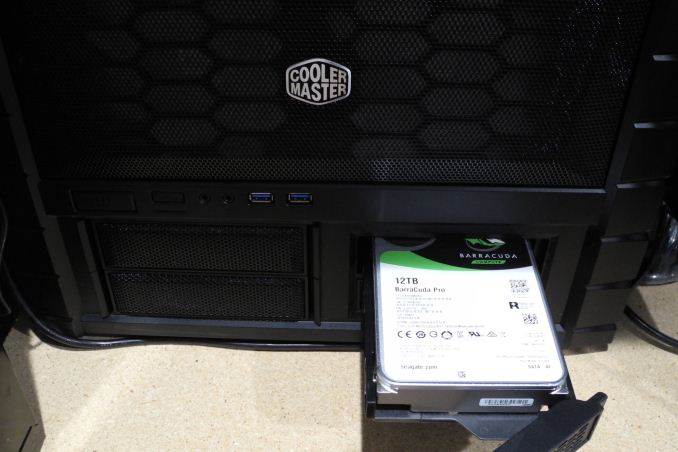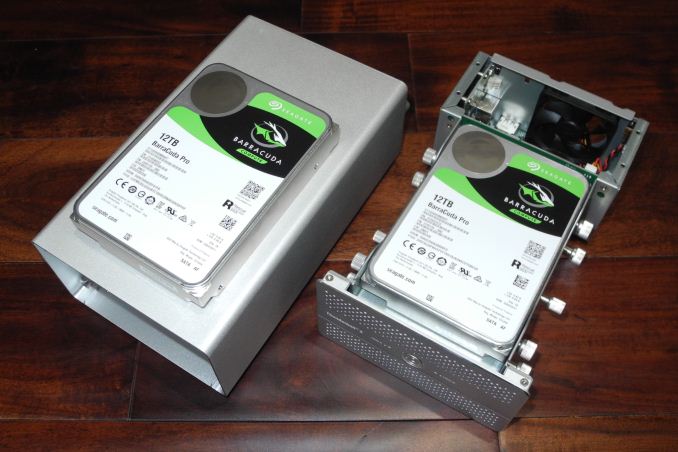Seagate BarraCuda Pro 12TB HDD Review
by Ganesh T S on November 15, 2017 8:00 AM EST- Posted in
- Storage
- Seagate
- HDDs
- Helium HDD
Concluding Remarks
The BarraCuda Pro 12TB is a unique product in the market. It is not often that we see a leading capacity 'desktop-class' hard drive rated for 24x7 operation or workload ratings of 300TB/year. To top it all, Seagate is even throwing in a 5-year warranty. A 2-year data recovery service (DRS) is also included. The lower load/unload cycles rating (300K, compared to the 600K in the equivalent NAS drives) and MTBF (1M hours, compared to 1.2M for the equivalent Pro NAS drive) are slightly disappointing aspects, but, they are more than made up for by the warranty and DRS.
In the gaming desktops market in particular, we are seeing per-game storage requirements running into 100s of GBs, and SSDs continuing to remain above $0.33/GB. Under these circumstances, high-capacity hard drives are bound to become relevant again. In our evaluation, the drive managed to perform quite well for largely sequential workloads (typical of bulk storage requirements in gaming workloads).
Consumers dealing with content creation can also use the BarraCuda Pro as part of a direct-attached storage system. For single-user scenarios, a DAS inherently makes more sense than a NAS. It allows use of enclosures sporting interfaces with higher speeds. The BarraCuda Pro 12TB drive shows great performance in such devices.
In our evaluation, the drive successfully met all of Seagate's claims. Helium drives have achieved economies of scale and are now mass-market devices. The current street price of the BarraCuda Pro 12TB ($500) is already lower than the suggested launch price ($530). The other 12TB Seagate options are the IronWolf NAS drive at $450, IronWolf Pro at $510, and the Enterprise Capacity at $469. We also have the Western Digital WD Gold at $522. The IronWolf has a lower workload rating (180 TB/yr vs 300 TB/yr) and also doesn't have the data recovery service available with the BarraCuda Pro and the IronWolf Pro. None of the enterprise drives carry the DRS option, which justifies the premium associated with the two Seagate Pro drives.
Pricing the BarraCuda Pro mid-point between the IronWolf and the IronWolf Pro would have made it an obvious choice for a high-capacity desktop / DAS usage drive. As it currently stands, it is difficult to choose between the IronWolf Pro and the BarraCuda Pro, as only $10 separates them. The IronWolf Pro also has a higher load/unload cycle rating. Seagate claims that the firmware in the BarraCuda Pro is tuned specifically for typical high-end desktop workloads. However, it is unlikely that consumers will see obvious performance differences between the two drives in typical single-user scenarios. In the end, the DRS ensures that customers are unlikely to go wrong with either the IronWolf Pro or the BarraCuda Pro, irrespective of the end application.












62 Comments
View All Comments
HStewart - Thursday, November 16, 2017 - link
Large amount of storage can be used for storage of logs and such especially when you have multiple locations. Of course you could have backupjameskatt - Sunday, November 19, 2017 - link
That is why you get three backups and an online backup.Arbie - Wednesday, November 15, 2017 - link
[Sorry, my question was for Ganesh, not the troll thread]I suppose it can be sussed out of the performance data, but... can you please say if this drive is shingle technology or not? With any Seagate drive that's one of my first questions, and they seem to have stopped identifying it in the literature.
ganeshts - Wednesday, November 15, 2017 - link
Oh, I covered that in the launch article, which is linked in the first paragraph.These are standard PMR drives, helium-ones with 8 platters.
XZerg - Wednesday, November 15, 2017 - link
I would suggest to include whether the drive is PMR, Shingled, ... storage in the table as both technologies co-exist but have different purpose/performance.Taracta - Wednesday, November 15, 2017 - link
Hello, the HD Tune random access are both Read not Read and Write. Please correct. Thank you.ganeshts - Wednesday, November 15, 2017 - link
My apologies! It has been fixed now.takeshi7 - Wednesday, November 15, 2017 - link
I really can't stand when people ask if a drive is SMR or "PMR". Every modern hard drive is PMR regardless of whether they are shingled or not. The proper term for a non-SMR drive is CMR.SMR - Shingled Magnetic Recording
CMR - Conventional Magnetic Recording
ganeshts - Wednesday, November 15, 2017 - link
That is a peeve I wouldn't object to, but, let us be honest - everyone treats SMR as the 'evolutionary update' to traditional PMR (CMR) drives. But, I appreciate this insight and will probably use it myself in future articles :)phoenix_rizzen - Wednesday, November 15, 2017 - link
To be pedantic, wouldn't SPMR and CPMR be more accurate?Shingled Perpendicular Magnetic Recording
Conventional Perpendicular Magnetic Recording